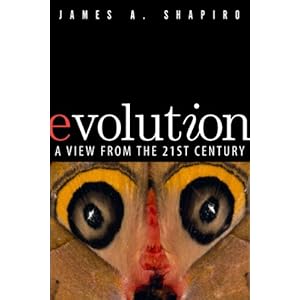Epigenetics
Darwin’s beneficial mutations do not benefit each other.
Here. Epistasis between Beneficial Mutations and the Phenotype-to-Fitness Map for a ssDNA VirusDarin R. Rokyta1*, Paul Joyce2, S. Brian Caudle1, Craig Miller3, Craig J. Beisel2, Holly A. Wichman3 Epistatic interactions between genes and individual mutations are major determinants of the evolutionary properties of genetic systems and have therefore been well documented, but few quantitative data exist on epistatic interactions between beneficial mutations, presumably because such mutations are so much rarer than deleterious ones . We explored epistasis for beneficial mutations by constructing genotypes with pairs of mutations that had been previously identified as beneficial to the ssDNA bacteriophage ID11 and by measuring the effects of these mutations alone and in combination. We constructed 18 of the 36 possible double mutants Read More ›
Non-supernatural ID?: University of Chicago microbiologist James Shapiro works with ID guys, dismisses Darwinism, offers third way

And people are talking about it. In this vid and pdf from his lecture at the university’s Graham School (October 2010), he lays out his thinking:
4. The DNA record tells us that major steps in genome evolution have involved rapid genome-wide changes.5. We know of molecular processes that allow us to think scientifically about complex evolutionary events – particularly about the rapid evolution of genomic circuits
and multi-component adaptations.
As author of Evolution: A view from the 21st century, he has also said at Fermilab (2010) that arch-Darwinist Richard Dawkins “lives in a world of fantasy,” stressing as above that “evolutionary theory needs mechanisms for very rapid, coordinated change.”
Read More ›
Epigenetic signatures: Another blow to the “it’s in yer genes” industry
At ScienceDaily (July 1, 2011), we learn, “Adult Stem Cells Carry Their Own Baggage: Epigenetics Guides Stem Cell Fate”:
Adult stem cells and progenitor cells may not come with a clean genetic slate after all. That’s because a new report in the FASEB Journal shows that adult stem or progenitor cells have their own unique “epigenetic signatures,” which change once a cell differentiates. This is important because epigenetic changes do not affect the actual make up in a cell’s DNA, but rather, how that DNA functions. Epigenetic changes have been shown to play a role in a wide range of diseases, including obesity, and have been shown to be heritable from mother to child.
Here’s an interesting take from a geneticist: Read More ›
Ah, priorities … and oh, consequences …
In “Did Erasmus Darwin foreshadow the tweaking of his grandson’s paradigm?” (The Scientist , 2011-03-01) , Andrew D. Ellington, a University of Texas biologist tells us,
The Lamarckian idea that giraffes’ reaching for leaves resulted in longer-necked progeny seems silly to us today, primarily because we know so very much about the underlying mechanisms of genetics. And yet Lamarck may have a last laugh—think inheritance patterns in ciliates, or the effect of diet on the coat color of agouti mouse offspring. We are in the midst of a paradigm shift in our understanding of how evolution can act…on evolution, yielding mechanisms that allow both adaptation and heritability within the course of a lifetime. And such paradigm shifts almost always have societal consequences. Manel Esteller shows that epigenetics also impacts the “dark genome” in a way that may improve cancer diagnostics. An even more far-reaching consequence is that it may prove possible to engineer epigenetics, as Bob Kingston’s Thought Experiment tacitly suggests. If so, will epigenetic engineering be subject to the same restrictions as genetic engineering? Or will this be a way that we can not merely treat disease, but possibly engineer human health into future generations?
And in the face of so momentous a revolution in our thinking, his worry is
We can expect that epigenetics will be held up as the forerunner of that bastard child of Creationism, Intelligent Design.
Such limited aims in the face of so vast an ocean of possibilities.
Not only is he right in his concerns, such as they are, but it helps to see why he is right. In the first place, the modern Darwinism enforced in schools is a narrow cult compared to what Darwin actually proposed about how evolution occurs. For example, as David Tyler notes, Read More ›
Epigenetics: But, Dr. Jablonka, the world just feels so lonely without the fat gene, the gay gene, and the God gene …
In “Traumatizing your DNA: Researcher warns that it isn’t ‘all in the genes’” (Physorg, March 23, 2011), we learn, Epigenetic research suggests that the effects of stress and environmental pollution can be passed on to future generations without any obvious change or mutation in our DNA. The problem, Prof. Jablonka points out, is that we have no idea of the extent these effects will have on the human genome of the future. “I am a story teller. I read a lot of information and develop theories about evolution. For the last 25 years, before it became a fad, I was interested in the transmission of information not dependent on DNA variations,” Dr. Jablonka says. “Epigenetic inheritance is information about us Read More ›
Epigenetics research weakened by unchallenged assumptions?
In “The Mark of Faith”, Harvard’s Robert E. Kingston (The Scientist, 2011-03-01) ponders the problem in science of belief precluding testing: The motivational issue is worrisome—on two levels. Even in flies, where the experiment is feasible, it will take a lot of work. But more to the point is the experience of one investigator who recently recounted that he was asked repeatedly why he would waste time doing an experiment that is so hard when everyone already knows the answer. The received wisdom is that of course methylation of lysine 27 is critical for epigenetic regulation: Isn’t it usually called an epigenetic mark? This reliance upon what is essentially an act of faith—methylation of histones makes sense as a mark Read More ›